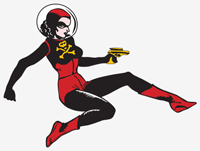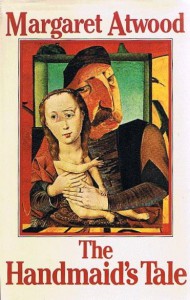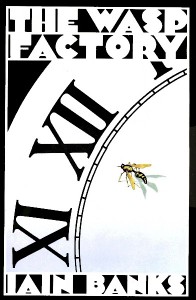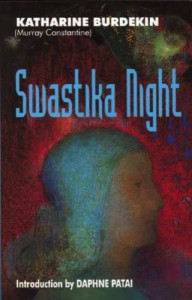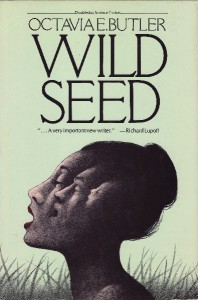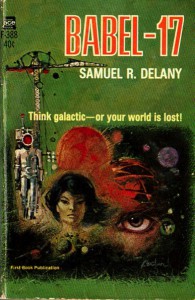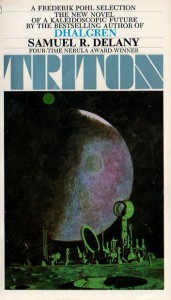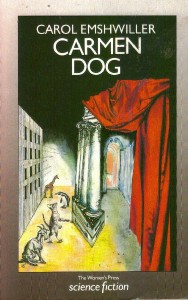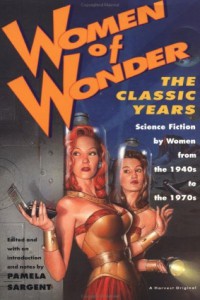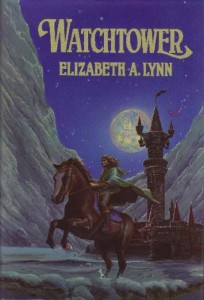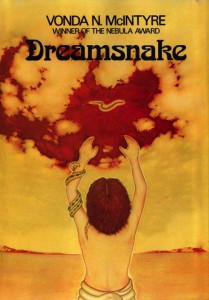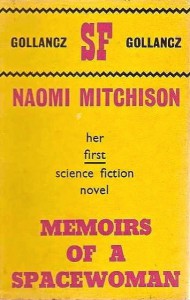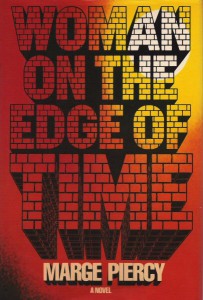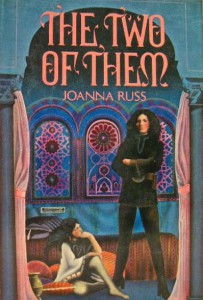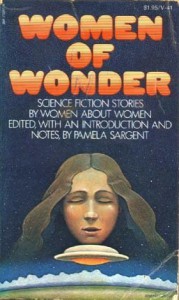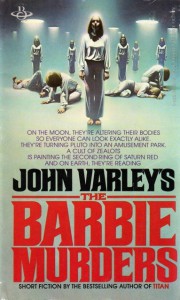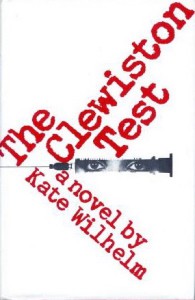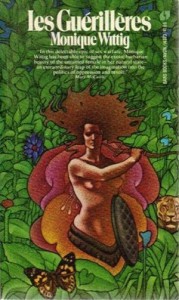Special Award Honor List
The 1995 jury chose 18 works for the Special Award Honor List.
What can the relationship be, Atwood asks, between a woman with no status whatsoever, and a man with nothing but privilege, and none of what he wants in life? Sexuality is the forced relation between the two main characters: intellectual exploration and the life of the mind is the relation discouraged for both separately and completely forbidden to them together, and that is the secret life they seek out and cherish. — Debbie Notkin Reading The Wasp Factory is like being in a car and realizing you are going to hit another vehicle head on: numbing, inevitable, fascinating, and followed by a mind-shattering bang and the rearrangement of your universe. When I first read this book I was washing myself clean of all that “all women are wise-kind-seven-feet-tall-vegetarian-amazons, and all men are nasty-horrid-raping-animals” nonsense resulting from a few years of being a right-on lesbian separatist. The Wasp Factory did more than rinse off the last sticky residue, it bleached me to the bone. — Nicola Griffith Possibly the first and arguably the best in the science fiction subgenre of Nazi dystopias. Germany wins World War II and reduces women to the status of slaves-kinder, kuche, kirchen taken to its illogical extremes. — Lucy Sussex Octavia Butler explores continuously not only the boundaries of gender, but of alienness wherever she may find it. In Wild Seed, which may still be her best book to date, she paints the joint canvasses of the horrors of ante-bellum slavery and the mysteries of immortality with the stories of Doro and Anyanwu-an immortal man and an immortal shapechanger with the heart and soul of a woman. Doro starts the book believing that he is a match for anything-but Anyanwu’s task is to show him that she is his equal and more. — Debbie Notkin In all the worlds of science fiction, no man has undertaken as rigorous and careful an alliance with feminism as Samuel R. Delany. In Babel-17, an early novel in his career, that alliance can be seen primarily in the full trust he places in his protagonist. The young Rydra Wong is as flawed as an interesting character must be-yet Delany has the courage to cut her problems, her limitations, and her inability, as well as her heroism, from the cloth of tales previously limited to men. Thus, he gives to a woman the fictional space that men usually fill, and the book is practically over before you realize why it was, in its time, such a daring departure. — Debbie Notkin In Triton, Delany is consciously exploring the spaces that both men and women fill. Triton is still the only book I’ve ever read where a man nurses his infant child during a professional meeting, where a woman — named the Spike takes up virtually all the adventure, heroism, and drama in the book while a man is left at home to whine and worry, fret, and feel left out. — Debbie Notkin The last section of Triton, which is a semi-Utopian novel about bohemian cool cats prowling around the arty parts of variously colonized and terraformed parts of the solar system, is very interesting about sexual gender. This is when our hero Bron Helstrom decides to have himself turned into a woman. He does this quite literally and seriously because he feels that men, whose ability to act alone, to function “outside society” when necessary, is vital to humanity, need a particular kind of support that only a woman-a proper woman-can give. And the women he knows don’t seem adequate for this supportive role at all. — Leave aside for the moment the question of how he reconciles man’s essential quality of being able to act alone, with man’s absolute need for a supportive woman. They just don’t know how to do it. So Bron gets changed into a woman, and then, he is outraged to discover that he still doesn’t feel like a woman. “I mean all the time, every minute, a complete and whole woman. Of course when I think about it, or when some guy makes a pass at me, I remember. But most of the time I just feel like an ordinary, normal” As a detailed study of sexual gender-physiological, chemical, psychological, cosmetic-Triton has few equals in science fiction, a genre which has always been all too well-provided with male sexual-utopians who are sure they know it all. I don’t know if this would have been a Tiptree prizewinner in 1976, I think there was some stiff opposition, wasn’t there? But still: lest we forget. Triton. And Samuel Delany. Thank you. — Gwyneth Jones The novel Carmen Dog goes well beyond the Tiptree Award prerequisite of “merely” exploring gender roles to tackle the blurring of interspecial boundaries. This tour de force combines the wisdom and charm of ancient fable and myth with the edge of contemporary satire and the heart of, well, its author, Carol Emshwiller. — Michaela Roessner Imagine a world where all the women are turning into animals and all the animals are turning into women. The heroine is Pooch, a former golden retriever who leaves home — taking the baby with her when her master starts showing her unwelcome attentions. Her mistress — who is becoming a snapping turtle presents a danger to the baby, so Pooch takes the child along. Pooch’s heart’s desire is to sing Carmen. Though I won’t tell you what happens I will say this: there’s a happy ending. When Carmen Dog came out, I couldn’t understand why people weren’t paying more attention to it. It was funny, ironic, painful, and wonderfully true in its consideration of women and other animals. — Pat Murphy A short story that packs a wallop, examining in just a few pages what it means to be a woman and what it means to be alien. — Pat Murphy Some books explore gender relations by studying what is special about the less familiar forms; others simply assume that love is love. Watchtower was one of the first books in this field to take homosexual love for granted. Never is the relationship between Sorren and Norres “called out” for its difference. They just love each other, and do what they have to do. Similarly, though Errel and Rike are not what we, with our limited definitions of the terms, would call lovers, the bond between them is taken completely at face value-and in the early 1970s, that was a breath of fresh air indeed. — Debbie Notkin I feel strongly that this book, beloved as it is, hasn’t been noticed for the gender-bender it is. Merideth is the first nongendered nonalien character I ever met in fiction — most people don’t even notice that the character is nongendered, because they instantly decide he is he or she is she. A terrific example of the construction of gender! And then the way conventional gender roles are changed, mostly by the capacity for voluntary birth control-subtle, profound, underappreciated. — Ursula K. Le Guin Dreamsnake is a quiet book except when it roars. It is a subtle book except when it reflects like sunlight off ice sheets. The exploration of gender begins quietly on page one and rises and falls throughout the novel, interwoven neatly with explorations of biology, geography, exile, and humanity. When you are finished with this book, all you want to do is pick it up and start again and you’re well-advised to do so. — Debbie Notkin Talk about underappreciated! This book predates the rest of us by years and goes very much farther than most of us ever went in gender-bending, invention of new roles, sex with aliens, etc.— Ursula K. Le Guin I read this book long long ago when, as a shy adolescent, I was reading my way through the science fiction section of the public library. I was an omnivorous reader then-paying little attention to titles and none to authors. But one idea from this book stuck with me, over all these years-the link, among the Martians, between communication and sensitive body parts that we regard as sexual. I remembered the explorer who became pregnant when communicating with a Martian, even though I had forgotten the rest of the book. A fascinating view of sex and human relations. — Pat Murphy The utopian novel must be among the very hardest tasks a novelist can set for herself. In Woman on the Edge of Time, Marge Piercy not only creates a complex and intricate utopian vision, but tosses in a dystopia and an all too realistic real world as well. Connie Ramos is one of science fiction’s most genuine heroines. She has to be dragged, kicking and screaming, into utopia. The rest of us, at the end of the book, have to be dragged out. This book is a heart-breaker. It makes you miss a world you’ve lost in the most complete possible way-by never having it to begin with. — Karen Joy Fowler Piercy simultaneously examines our own world and constructs a fascinating future culture in which gender roles have changed. Some changes are subtle. Connie, the contemporary viewpoint character, notices that the woman from the future “moved with that air of brisk, unself-conscious authority that Connie associated with men.” Other changes are more radical. Connie is appalled to discover that men in this future mother and breastfeed children, usurping women’s role as nurturer. A thoughtful and moving story. Incidentally, Piercy foresaw a version of the Tiptree Award. Her future culture celebrates the beginning to the women’s movement with an annual festival in which they eat little honey cakes with quotes from revolutionary women baked in them. Sound like a Tiptree bake sale to me. — Pat Murphy The Two of Them is typical Joanna Russ: the first two-thirds twist and turn, eeling around to bite its own assumptions in the small of back so often it made me want to throw the book at the wall. But it’s a bit like a black hole: by the time you’re beginning to wonder what’s going on, you’re in the gravity well and it’s too late. And when Russ has you, she is merciless. This book taught me a tremendous amount about the way women and men relate to each other, and why, and how hard it is to avoid the trap. — Nicola Griffith “The Barbie Murders” is only one of Varley’s many stories set in the Eight Worlds, where the exploration of gender and sexuality is rich indeed. This particular story concentrates on identity by focusing on a colony of people who have chosen to forsake the concept entirely-and, of course, to forsake identity one must forsake gender. A detective in search of a murderer is hampered indeed by a society based on the first principle that the action of one is the action of all. When can identity be erased, and when must it be preserved so that justice can be done? — Debbie Notkin He’s a nice guy. He makes sure that his wife, a brilliant biochemist now bedridden after a car accident, has everything she needs. And, after months of enforced celibacy, what could be of more benefit than a good screw? If she doesn’t agree that this is what she needs, then clearly she’s as sick in the head as she is in the body. In a lesser writer’s hands, The Clewiston Test could easily have collapsed into another murky tale of an abused gothic-style heroine. But with exquisite clarity, Wilhelm shows that personal autonomy and sexual heroism are the same thing, and that a man’s reputation for marital niceness is the measure of his privilege to be bad. This book is as threatening now as it was twenty years ago when it was first published. — Sherry Coldsmith This is one of the few science fiction novels about science and the context-political, economic, social, and personal-in which real science happens. A woman scientist discovers a truly effective treatment for pain, which may have horrifying side effects. The situation is complicated by the fact that she has been seriously injured in a car accident and is in pain herself. Will she or has she used the treatment? Has it or her accident driven her crazy? Are the men around her-her husband and fellow scientists-right in doubting her sanity? Does any of this sound familiar? The novel is distinguished by Wilhelm’s usual beautiful writing-she has to be in contention for the field’s premier stylist, by her respectful and intelligent description of a woman who practices science, and by the fact the woman’s male doctor does not turn out to be a sexist creep. Talk about bending a gender stereotype! — Eleanor Arnason Les Guerilleres is a fierce and witty dramatization of the relationship between women and language. Monique Wittig’s future, separatist almost women-only world may be familiar to science fiction readers, but her use of it to turn upside down assumptions about nature and culture and bodies and language is original and exciting. — Sarah Lefanu There’s a joke I heard back in the 1970s, when jokes about lightbulbs were common. “Question: How many feminists does it take to screw in a lightbulb? Answer: That’s not funny.” You see, it’s well known that feminists have no sense of humor. They are dour, sour, cranky people who just can’t take a joke. Right. “Heat Death of the Universe” is a story that made me laugh in the most painful way as it considers Frosted Flakes and entropy, motherhood and madness, ontology and feminine beauty. After reading it, I could never regard the role of the housewife in the same way, ever again. — Pat MurphyThe Handmaid's Tale by Atwood Margaret (Houghton Mifflin, 1986)
Work Information
Title: The Handmaid's TaleAuthor: Atwood MargaretPublisher:
Publisher Name: Houghton MifflinCountry: USAYear: 1986The Wasp Factory by Iain Banks (McMillan, 1984)
Work Information
Title: The Wasp FactoryAuthor: Iain BanksPublisher:
Publisher Name: McMillanCountry: United KingdomYear: 1984Swastika Night by Katherine Burdekin (Feminist Press, 1985)
Work Information
Title: Swastika NightAuthor: Katherine BurdekinPublisher:
Publisher Name: Feminist PressCountry: USYear: 1985Wild Seed, Patternist Series 4, by Octavia Butler (Doubleday, 1980)
Work Information
Title: Wild SeedAuthor: Octavia ButlerSeries:
Series Title: PatternistSeries Number: 4Publisher:
Publisher Name: DoubledayCountry: USYear: 1980Babel-17 by Samuel R. Delany (Ace, 1966)
Work Information
Title: Babel-17Author: Samuel R. DelanyPublisher:
Publisher Name: AceCountry: USYear: 1966Triton by Samuel R. Delany (Bantam, 1976)
Work Information
Title: TritonAuthor: Samuel R. DelanyPublisher:
Publisher Name: BantamCountry: USYear: 1976Carmen Dog by Carol Emshwiller (Mercury Press, 1990)
Work Information
Title: Carmen DogAuthor: Carol EmshwillerPublisher:
Publisher Name: Mercury PressCountry: USYear: 1990When I Was Miss Dow by Sonya Dorman Hess (Vintage, 1974)
Work Information
Title: When I Was Miss DowAuthor: Sonya Dorman HessCollection:
Title: Women of Wonder, the Classic Years: Science Fiction by Women from the 1940s to the 1970s Editor: Pamela SargentPublisher:
Publisher Name: VintageCountry: USYear: 1974Watchtower by Elizabeth A. Lynn (Berkley, 1979)
Work Information
Title: WatchtowerAuthor: Elizabeth A. LynnPublisher:
Publisher Name: BerkleyCountry: USYear: 1979Dreamsnake by Vonda McIntyre (Houghton Mifflin, 1978)
Work Information
Title: DreamsnakeAuthor: Vonda McIntyrePublisher:
Publisher Name: Houghton MifflinCountry: USYear: 1978Memoirs of a Spacewoman by Naomi Mitchison (Gollancz, 1962)
Work Information
Title: Memoirs of a SpacewomanAuthor: Naomi MitchisonPublisher:
Publisher Name: GollanczCountry: USYear: 1962Woman on the Edge of Time by Marge Piercy (Fawcett, 1985)
Work Information
Title: Woman on the Edge of TimeAuthor: Marge PiercyPublisher:
Publisher Name: FawcettCountry: USYear: 1985The Two of Them by Joanna Russ (Berkley-Putnam, 1978)
Work Information
Title: The Two of ThemAuthor: Joanna RussPublisher:
Publisher Name: Berkley-PutnamCountry: USYear: 1978Women of Wonder by Pamela Sargent (ed.) (Vintage Books, 1975)
Work Information
Title: Women of Wonder (Series)Editors: Pamela Sargent (ed.)Works in Series
Publishers:
Publisher Name: Vintage BooksCountry: USYear: 1975The Barbie Murders by John Varley (ed.) (Berkley Books, 1980)
Work Information
Title: The Barbie MurdersEditors: John Varley (ed.)Collection:
Title: The Barbie Murders Editor: John VarleyPublisher:
Publisher Name: Berkley BooksCountry: USYear: 1980The Clewiston Test by Kate Wilhelm (Farrar Straus Giroux, 1976)
Work Information
Title: The Clewiston TestAuthor: Kate WilhelmPublisher:
Publisher Name: Farrar Straus GirouxCountry: USYear: 1976Les Guérillères by Monique Wittig (Peter Owen Publishers, 1971)
Work Information
Title: Les GuérillèresAuthor: Monique WittigAlternate Title:
Title: Les GuérillèresPublisher: Les Éditions de MinuitYear: 1969Publisher:
Publisher Name: Peter Owen PublishersCountry: UKYear: 1971The Heat Death of the Universe by Pamela Zoline (Harcourt Brace, 1995)
Work Information
Title: The Heat Death of the UniverseAuthor: Pamela ZolineCollection:
Title: Women of Wonder, the Classic Years: Science Fiction by Women from the 1940s to the 1970s Editor: Pamela SargentPublisher:
Publisher Name: Harcourt BraceCountry: USYear: 1995
